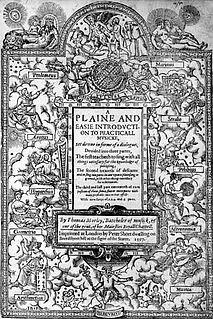John Dowland was an English Renaissance composer, lutenist, and singer. He is best known today for his melancholy songs such as "Come, heavy sleep", "Come again", "Flow my tears", "I saw my Lady weepe" and "In darkness let me dwell", but his instrumental music has undergone a major revival, and with the 20th century's early music revival, has been a continuing source of repertoire for lutenists and classical guitarists.
Angela Morley was an English composer and conductor who, as Stott, became a familiar household name to BBC radio listeners in the 1950s. She attributed her entry into composing and arranging largely to the influence and encouragement of the Canadian light music composer Robert Farnon. In 1972, Morley underwent sex reassignment surgery. Later in life, she lived in Scottsdale, Arizona.

Robert Adolph Wilton Morley, CBE was an English actor who was usually cast as a pompous English gentleman representing the Establishment, often in supporting roles. In Movie Encyclopedia, film critic Leonard Maltin describes Morley as "recognisable by his ungainly bulk, bushy eyebrows, thick lips and double chin, ... particularly effective when cast as a pompous windbag." More politely, Ephraim Katz in his International Film Encyclopaedia describes Morley as "a rotund, triple-chinned, delightful character player of the British and American stage and screen." In his autobiography, Responsible Gentleman, Morley said his stage career started with managements valuing his appearance for playing "substantial gentleman" roles — as a doctor, lawyer, accountant or other professional member of society.

Grace Beverly Jones OJ is a Jamaican-American supermodel, singer, songwriter, record producer, and actress. Born in Jamaica, she moved when she was 13, along with her siblings, to live with her parents in Syracuse, New York. Jones began her modelling career in New York state, then in Paris, working for fashion houses such as Yves St. Laurent and Kenzo, and appearing on the covers of Elle and Vogue. She worked with photographers such as Jean-Paul Goude, Helmut Newton, Guy Bourdin, and Hans Feurer, and became known for her distinctive androgynous appearance and bold features.
"She Moved Through the Fair" is a traditional Irish folk song, which exists in a number of versions and has been recorded many times. The narrator sees his lover move away from him through the fair, after telling him that since her family will approve, "it will not be long, love, 'til our wedding day". She returns as a ghost at night, and repeats the words "it will not be long, love, 'til our wedding day", intimating her own tragic death, as well as the couple's potential reunion in the afterlife.
Robert Jones was an English lutenist and composer, the most prolific of the English lute song composers.
"People Will Say We're In Love" is a show tune from the Rodgers and Hammerstein musical Oklahoma! (1943). In the original Broadway production, the song was introduced by Alfred Drake and Joan Roberts.
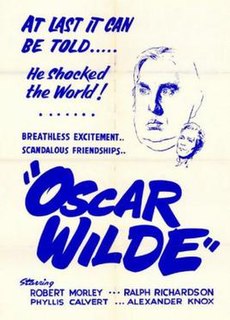
Oscar Wilde is a 1960 biographical film about Oscar Wilde, made by Vantage Films and released by 20th Century Fox.

Ring-a-Ding-Ding! is a 1961 album by Frank Sinatra. It was the inaugural record on Sinatra's Reprise label and, as the initial concept was "an album without ballads", it included only uptempo swing numbers.

Gershwin Live! is a 1982 live album by Sarah Vaughan, of music composed by George Gershwin, accompanied by the Los Angeles Philharmonic, conducted by Michael Tilson Thomas. The album was arranged by Marty Paich.
Roberts and Barrand is a musical group formed in 1969 by John Roberts and Tony Barrand while they were graduate students in psychology at Cornell University. Much of their repertoire is traditional English music, although they have also recorded albums of traditional sea shanties.
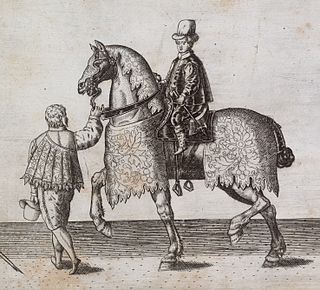
Daniel Bacheler, also variously spelt Bachiler, Batchiler or Batchelar, was an English lutenist and composer. Of all the English lutenist-composers, he is now credited as probably being the most successful in his own lifetime.
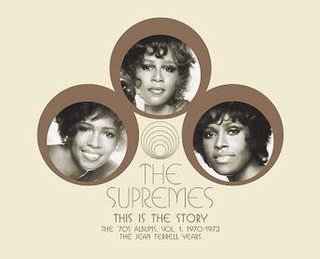
This Is The Story is a box set, released in 2006, comprising The Supremes' albums from the period 1970-1973, featuring new lead singer Jean Terrell, along with Mary Wilson, Cindy Birdsong and Lynda Laurence In addition to the five studio albums Right On, New Ways But Love Stays, Touch, Floy Joy, and The Supremes Produced and Arranged by Jimmy Webb, the set also includes thirteen tracks from the group's unreleased 1972 album, Promises Kept. Not included from the same time period are the three duet albums recorded with Four Tops; these were issued in full in 2009 on the 2-CD compilation Magnificent - The Complete Studio Duets, which included 13 previously unreleased recordings.

Can She Excuse My Wrongs is a late 16th-century song by the English Renaissance composer John Dowland, the fifth song in his First Booke of Songes or Ayres. The words are set to a dance-tune, a galliard.
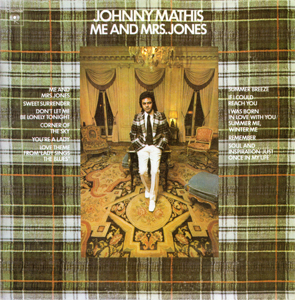
Me and Mrs. Jones is an album by American pop singer Johnny Mathis that was released in January 1973 by Columbia Records. While it does cover several big chart hits of the day like his last album, Song Sung Blue, did, it also includes songs that didn't make the US Top 40 or had never charted.
The Willow song is an anonymous Elizabethan or earlier folk song used in the penultimate act of Shakespeare's Othello. The earliest record of The Willow Song is in a book of lute music from 1583, while Shakespeare's play was not written until 20 years later in 1604. The song in Shakespeare's play is sung by Desdemona, Othello's wife, when she has begun to fear her jealous husband.
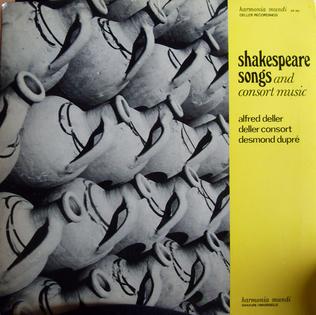
Shakespeare Songs is a 1967 LP album of Elizabethan songs which is one of the most celebrated recordings of the countertenor Alfred Deller. Deller is accompanied by lutenist Desmond Dupré and the Deller Consort, Philip Todd and Max Worthley tenors, Maurice Bevan baritone.


